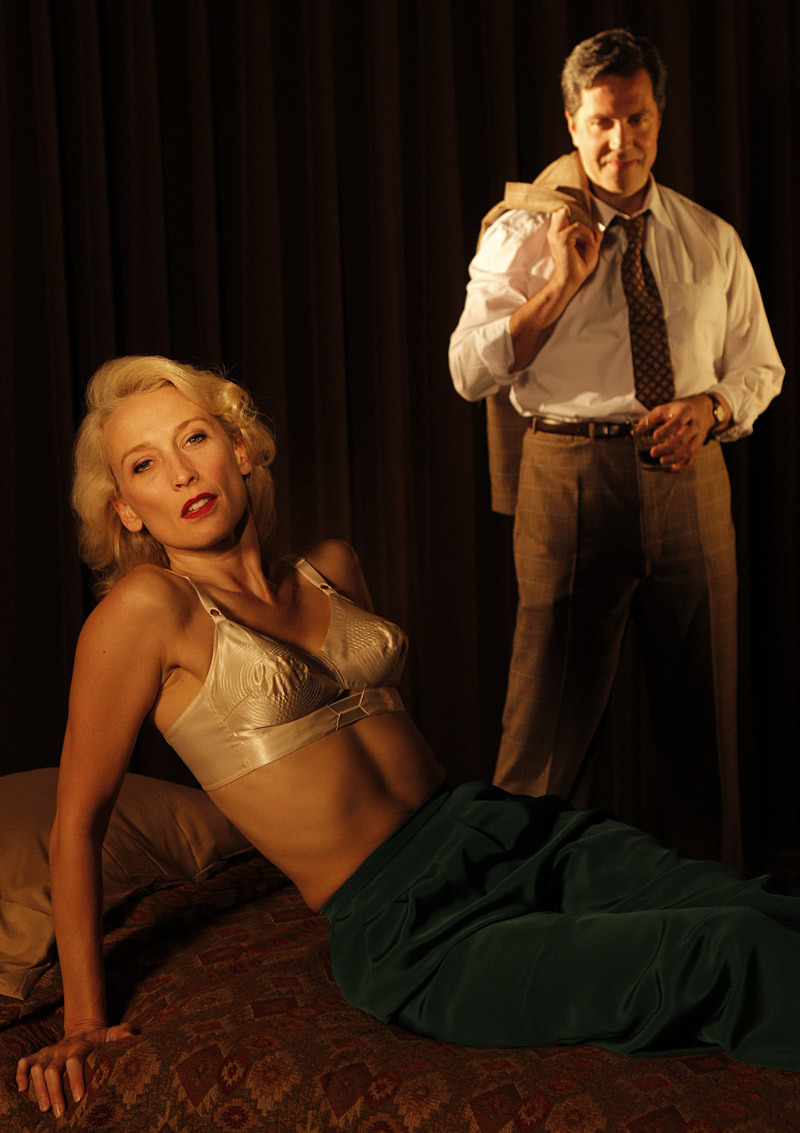Behind every great film, there’s a mediocre book. Or sometimes a fantastic play. And sucky movies also get made from classics of literature. There’s really no predicting with adaptations. In the case of David Pichette and R. Hamilton Wright, maybe they thought, “Hey, Double Indemnity the movie is so good that we should make it into a play.” But they didn’t want to simply reprise Billy Wilder’s classic 1944 film noir, nor model their leads on the villains played by Barbara Stanwyck and Fred MacMurray, so they studied Double Indemnity the novel, first serialized by James M. Cain in 1936. Thus Double Indemnity the play, a solid entertainment that lacks the movie’s malign surprise.
Working with Raymond Chandler on the screenplay, Wilder punched up the old prose considerably, making Cain seem much more clever than he was. (He’s more plot engineer than story architect.) But by sticking to the novel’s original language, Pichette and Wright lose most of the Hollywood zingers.
Onstage, murderous trophy wife Phyllis (Carrie Paff) and insurance agent/fall guy Walter (John Bogar) may be truer to Cain’s conception, but the price is a reversion to flat old pulp-fiction types: femmes fatales and saps. Walter relates half his doomed scheme to us in direct address, sometimes covering what we’ve already seen (or know from the movie). He’s not exactly stupid, but a calculating dolt who gambles on the wrong chance. Phyllis remains more of a giddy, implausible cypher. When she stops to explain herself (“I think of myself as death sometimes”), it’s as some kind of she-banshee, far different from Stanwyck’s flesh-and-blood adulteress. There’s an almost supernatural quality to this Phyllis, only Paff isn’t given the dark poetry to express it. (Expression is more direct when dancing half-naked on a divan; you can see what Walter wants.)
After Phyllis’ husband is dispatched (shortly before intermission), Double Indemnity gains some steam. The seduction past, betrayal to come, this condensed Cain is stronger on the banter among insurance-company equals, guys who speak the same plain language, no estrogen allowed. While Walter seeks to conceal his crime from his co-workers (Mark Anderson Phillips and Richard Ziman), they take as much pleasure in dissecting this “perfect murder” as he did in planning it. Amid their banter, punctuated by a pocket flask, are ping-pong pre-echoes of David Mamet. They, like so many readers of the ’30s, are enthusiastic students of popular crime novels; today, that everyday genre has bloated into global terrorism thrillers and paranormal fantasies. (What writer or playwright today would devise a hero from the mundane realm of insurance?)
Directed by Kurt Beattie and with a rotating, elegantly minimal set by Thomas Lynch, this Double Indemnity often casts its players in ominous Venetian-blind shadows. It’s all very noir; and the dark-angel figure of Phyllis almost suggests German Expressionist cinema. Or even opera—which might be a better direction for the next adaptation. Just start with Wilder and Chandler for the libretto.








